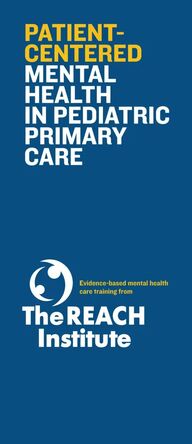
Return to flip book view
I became much more comfortable with managing ADHD aggression mood disorders anxiety and autism in a primary care setting after your program Patty Barfield APRN Child Adolescent Training in Evidence Based Psychotherapies for psychologists social workers and other therapists Adult Behavioral Health in Primary Care for family physicians and primary care providers treating adults doable approach to Practical caring for children with mental illness This should be part of all pediatric Adrienne Classen MD residency training programs CBT for Anxiety in Pediatric Primary Care for pediatricians and other pediatric primary care providers Dana Ramirez MD I can actually apply the information I learned in a meaningful way Evelyn Hurvitz MD to make a difference to my patients Sarah Chagnon MD Visit TheREACHInstitute org to find out about other training opportunities PATIENTCENTERED MENTAL HEALTH IN PEDIATRIC PRIMARY CARE Addressing Trauma in Pediatric Primary Care for pediatricians and other pediatric primary care providers Self paced online courses for primary care and mental health providers Evidence based mental health care training from 530 7th Avenue Floor M1 New York NY 10018 212 947 7322 info TheREACHInstitute org
BENEFITS Pediatric physicians nurse practitioners physician assistants and other primary care providers become confident in diagnosis and treatment of behavioral health issues Practices and healthcare systems achieve consistency of care and realize cost savings Families learn to support their child s emotional health Children and youth learn to manage their issues so they can thrive PARTICIPANT RATINGS THE PATIENT CENTERED MENTAL HEALTH IN PEDIATRIC PRIMARY CARE PROGRAM trains clinicians to diagnose and treat mental health conditions they see every day in practice With REACH training you can Integrate behavioral health into your primary care practice Manage the most common issues yourself Save referrals to mental health specialists for complex cases THREE DAY LIVE TRAINING EVENTS are held either online or in person at locations throughout the U S The sessions are practical hands on and interactive Follow up teleconferences help participants apply their learning PARTICIPANTS LEARN not only to diagnose and treat patients but also to refer families to appropriate supports such as cognitive behavioral therapy You ll leave the training with tools you can use immediately Validated assessments to gather data from patients and families Clinical guidelines for differential diagnosis Quick reference medication guides For the current training schedule visit TheREACHInstitute org For more information contact ppp TheREACHInstitute org Participants consistently rate course quality as high 4 7 to 5 0 on a 5 point scale They report greater knowledge of and comfort in assessing diagnosing and treating ADHD depression anxiety and comorbid conditions at rates ranging from 42 to 83 In one study these improvements continued six months after training Self Reported Improvements in Skill Confidence 6 Months After Training N 83 ADHD TRAINING AGENDA Day 1 Pediatric psychopharmacology Assessment tools Anxiety disorders assessment treatment Day 2 Depression assessment treatment Assessing managing suicidality Pediatric bipolar disorder ADHD assessment treatment Day 3 Aggression assessment treatment Psychosis Coding for billing Next steps for your practice Next 6 months Depression Anxiety 0 1 2 3 Treat Cohort members meet by phone twice a month to discuss cases Assess CMEs AMA PRA Category 1 Credits available 0 No change 1 Small amount 2 Moderate amount 3 Great amount EVIDENCE OF EFFECTIVENESS A study using standardized regional healthcare data found that trained physicians were better able to identify and manage child and adolescent mental health concerns within their primary care practices McCaffrey Chang Farrelly Rahman Cawthorpe 2017 Mental health literacy in primary care BMJ Evidence Based Medicine 22 123 131 Federally funded research using Medicaid data found that REACH trained physicians reduced costs by 120 per patient an average of 6 000 per physician per year Savings resulted from decreased medication costs and fewer specialty mental health referrals Domino et al 2012 Changes in ADHD prescribing after psychotropic medication training In Scientific Proceedings of the Annual Research Meeting American Public Health Association San Francisco